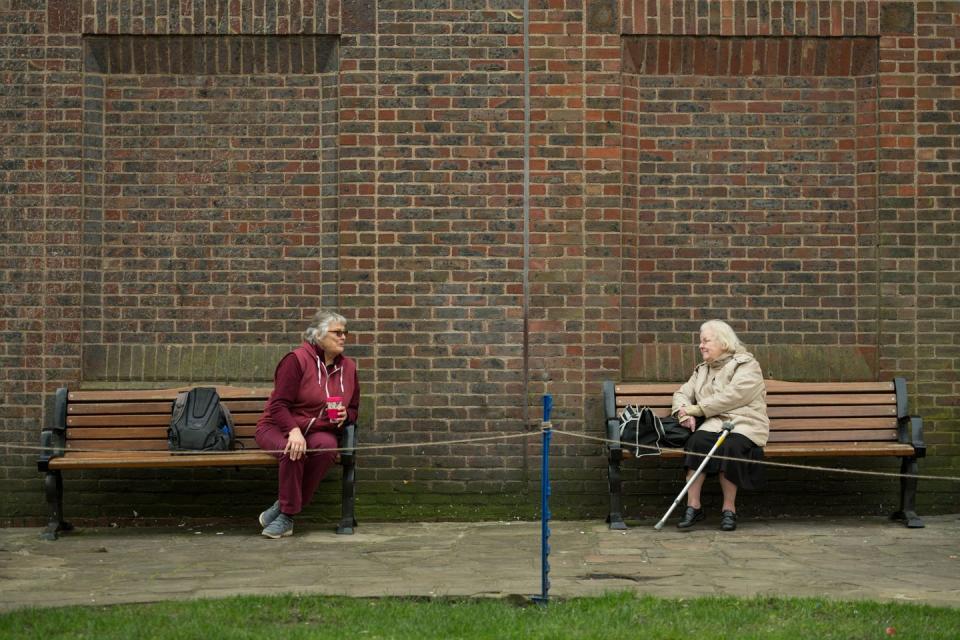Could social distancing actually be good for humanity?

This time last year, none of us had heard of the phrase, 'social distancing'. Now, few people are unaware of these words or their meaning. To protect ourselves from the viral pandemic dominating daily life, we avoid close contact with others. Face masks and latex gloves help prevent contagion while our environments are visibly re-contoured. Boundary-marking hazard tape, neon arrows and footprint stickers all indicate the permissible two-metre zone.
Covid-19 has left many feeling bereft of physical contact and for the socially isolated, the policy seems cruel. From baby massage to the negative effects of Touch Starvation also known as ‘skin hunger’, we understand the primal need for touch. So, these censures on physical contact, public hugging, kissing or touching, have been felt keenly. In The Touch Test, part of All in The Mind (BBC Radio 4) Claudia Hammond recently launched a major investigation into this germane topic.

It may seem like we’ve woken up in a huge branch of IKEA with endless one way navigation but I like the space being redesigned into our systems and networks; space that puts people first. Throughout lockdown and beyond, I’ve actively relished the airiness of the new world. Perhaps, it’s because I live in London, a densely packed city of over nine million or because I come from a close family but I can feel the many advantages to social distancing.
There’s relief in not feeling like a veal calf, cheek by jowl on public transport and unbridled joy at not having to sniff another commuter’s underarms. Perusing shop merchandise is a more pleasant, jostle-free experience and despite mask-wearing, I sense people are looking at and taking more interest in each other.
The psychological term for the notion of personal space is, Proprioception and like sight or hearing is a key human sense. According to Professor Carolyn Mair PhD, Behavioural Psychologist and author of The Psychology of Fashion “Proprioception is the sense of our physical selves in the space we occupy and can help protect and control who or what enters our personal space. It’s subjective, so for those who prefer to be more distanced from others, it can work like an invisible armour.” Proprioception is also socially and culturally constructed. “The traditional Brit is often reserved and distant, preferring to shake hands when being introduced whereas many Europeans are quick to hug and kiss in the same situation.”
In a culture where touching a woman’s body without permission has been historically okay, there may also be a gender dimension to proprioception. All that shoulder rubbing, arm squeezing and pregnant tummy stroking is, on one level innocuous and harmless but on another, intrusive and unwelcome. The idea of touching another’s body without consent was, of course, highlighted as part of the #MeToo movement and has given women increased agency. Unwarranted touching doesn’t have to be extreme as sexual assault for it to feel wrong or discomforting.

“For those with greater need for personal space, this climate has given license to not hold or hug without having to come up with some excuse. In the past, they might have been accused of frigidness, sadly an idea that still pervades. From a feminist perspective, I can see social distancing might be welcomed, although some men also find hugging awkward, maybe for feelings it can bring to the surface or wanting to maintain a macho persona,” adds Mair.
Virginia Woolf identified the concept of A Room of One’s Own in her 1929 extended essay. She argued women required financial and physical space in order to think freely and create without everyday interruptions. Nearly a century later, her belief continues to resonate with many women. Arguably, personal space is the room that moves with us, an impenetrable, transparent bubble. As a youngster in my family home, which was often busy and boisterous, the only place I could escape to, much to my family’s bafflement was the loft not a loft conversion. It was chilly and uncomfortable with itchy lagging and uncomfortable beams but it was my own space where I wouldn’t be disturbed.
Mair maintains social distancing and retaining personal space doesn’t mean we can’t be close to others. “We just have to work harder at expressing ourselves through different forms of communication: technology, words, voices, facial expressions and gestures. When writing e-mails or texts, consider bolding out or italicising words to express key phrases more effectively or using emojis to reduce ambiguity of tone. Hand written postcards and letters are a great way to show gratitude and improve the wellbeing of both the sender and receiver.” When Covid-19 is a distant memory, I’ll continue to keep my distance and will resist rejoining the consumer hoards. I am not a sardine. I am a human being.
Like this article? Sign up to our new newsletter to get more articles like this delivered straight to your inbox.
You Might Also Like


